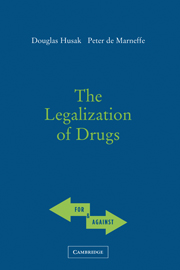Book contents
- Frontmatter
- Contents
- General Editor's Preface
- The Legalization of Drugs
- I For Drug Legalization
- 1 The Meaning of Drug Decriminalization
- 2 How Should We Evaluate Alternative Drug Policies?
- 3 Reasons to Criminalize Drug Use
- 4 Reasons to Decriminalize
- 5 Drug Legalization: Production and Sale
- II Against Drug Legalization
- Further Readings
- Index
5 - Drug Legalization: Production and Sale
Published online by Cambridge University Press: 05 June 2012
- Frontmatter
- Contents
- General Editor's Preface
- The Legalization of Drugs
- I For Drug Legalization
- 1 The Meaning of Drug Decriminalization
- 2 How Should We Evaluate Alternative Drug Policies?
- 3 Reasons to Criminalize Drug Use
- 4 Reasons to Decriminalize
- 5 Drug Legalization: Production and Sale
- II Against Drug Legalization
- Further Readings
- Index
Summary
Suppose I am correct that some or even all of the drugs pre- sently criminalized for recreational purposes should be decriminalized. This conclusion, although defensible on grounds of justice, only begins to describe a comprehensive drug policy. A complete account must take a position on the thorny issue of production and sale of decriminalized drugs. A given drug is legalized when its production and sale are not criminal offenses. Should newly decriminalized drugs be legalized? This is the issue I propose to address in this final chapter. My discussion will only scratch the surface of this complex topic.
The first point to recall is that drug decriminalization and legalization are separate issues. Decriminalization, as I have defined it, has no direct implications for production or sale. It is entirely consistent with punishing producers and/or sellers of newly decriminalized drugs. Many official government reports – such as that of the Shafer Commission – have made this very recommendation, at least for marijuana. Anyone who believes that this combination of policies is incoherent should be reminded of our nation's history. From 1920 to 1933 – the era known simply as prohibition – the sale (or production for sale) of alcohol was a federal offense. But the use of alcohol was not a crime. Of course, few historians believe this combination of policies worked well. Some go so far as to describe it as a disaster. Still, alcohol prohibition was a reality.
- Type
- Chapter
- Information
- The Legalization of Drugs , pp. 96 - 106Publisher: Cambridge University PressPrint publication year: 2005
- 1
- Cited by



